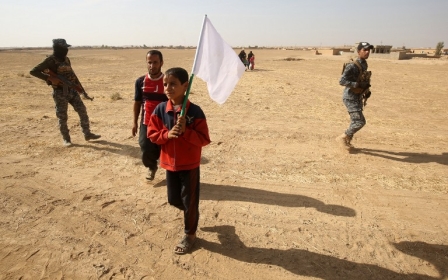After decades of chaos, can Iraq's crises end in Mosul?

Iraq is the political epicentre of our region, a microcosm of all of the political, economic and demographic problems found across the Middle East and, as a result, the heart of our suffering.
Throughout the 20th century, Iraq has experienced various forms of instability and pain. After 1980 alone, the country was engaged in the longest war of the 20th century with neighbouring Iran, suffered the destruction and heavy cost of the Gulf War and, with the dawning of the new millennium, was occupied, pushing uncertainty to a whole new level.
IS drew its military capability from a state bureaucracy and army that was dissolved in the worst and most irresponsible way possible
A country that could not break out of a cycle of wars, a cruel sanctions regime, an occupation and a civil war for 36 years still lingers in agony today, with each passing day bringing even more anxiety.
Layer cake of crisis
In the aftermath of the US occupation, Iraq fractured at three points. First, during the chaos that ensued when the government and military were dissolved under the “de-Baathification” policy; secondly, with the violent polarisation and fanatical sectarianism following the 2005 election for which the country was quite unprepared; and finally, the pushing of the Iraqiyyah movement out of the system by a coerced-coalition following the 2010 election.
The third fracture point in 2010 is still the main basis of the crises in Iraq today, the number one result of which is the Islamic State (IS) militant group. Almost 50 years of Iraqi crises have been whittled down to the sole problem of IS, in the same way that the massacres committed by the Assad regime have been glossed over as the fight against IS has been prioritised.
It is as if IS is the worst disaster which has befallen Iraq in the past 36 years, even though the origins behind the group's emergence are decades of turmoil.
The support that social groups and local tribes gave to IS were a result of the Iraqi government's sectarian policies which made Saddam's methods pale in comparison
However, IS's presence in Mosul specifically stems from Iraq’s post-occupation administration as much as from the group's actions. More generally, almost all of the causes that led to the group's emergence are rooted in the US occupation and the various Iraqi governments formed in the aftermath.
To a large extent, IS drew its military capability from a state bureaucracy and army that was dissolved in the worst and most irresponsible way possible. Similarly, the support that social groups and local tribes gave to IS were a result of the Iraqi goverment's sectarian policies which made Saddam's methods pale in comparison.
Strategy gone wrong
The policies betweeen 2005 and 2012 that contributed to the formation of IS in Iraq escalated into a more dangerous phase in the hands of long-time "Damascus affiliate”, Nouri al-Maliki.
In Syria, prisons were evacuated in haste, unleashing IS on the Syrian opposition. This policy completely overlooked the potential problems it would cause in Iraq and rapidly cleared the road for IS. Intended to help Damascus, IS instead took over Mosul and turned into a threat for Baghdad.
In a country where all of the revenue comes from energy sources, all actors must realise that there must be political sharing for all to partake in the wealth
At this point, independently from the Mosul offensive, the eradication of IS or similar groups in the future will remain a naive approach unless an agenda is advanced to solve the “Sunni problem” in Iraq and in the region.
With Najaf-based groups in the south, the Green Zone in Baghdad and its outskirts, the Erbil government in the north and IS-held areas around Mosul, Iraq has become an extremely difficult country to govern and one without an umbrella of security institutions.
Share the wealth
From Shia paramilitary groups to transnational terror groups such as the PKK and IS, from independent boutique armies of various Shia groups to Sunni groups, a chaotic situation exists in Iraq. Similarly, the country's social fabric is seriously torn up and fragmented.
In the next phase, there is only one way out: in a country where all of the revenue comes from energy sources, all actors must realise that there must be political sharing for all to partake in the wealth.
At the centre of the political sharing crisis, however, lies “the Sunni problem”, a legacy from the days of the US occupation when Sunni Arabs, Kurds and Turkmen were marginalised and ignored, an ongoing issue that must be deeply understood now.
A similar catastrophic mistake, as was made in the past, must not be repeated in Mosul. Yet when one looks at the administration in Baghdad and its eagerness to repeat in Mosul what IS has done to Mosul, anyone with sound wisdom should be frightened.
- Taha Ozhan is a member of Turkish Parliament and chairman of Foreign Affairs Committee. He is an academic and writer. Ozhan holds a PhD on Politics and International Relations. He frequently comments and writes for international media. His latest book, Turkey and the crisis of Sykes-Picot Order (2015).
The views expressed in this article belong to the author and do not necessarily reflect the editorial policy of Middle East Eye.
Photo: An Iraqi child who fled Mosul, the last major Iraqi city under the control of the Islamic State (IS) group, carries diapers at the UN-run Al-Hol refugee camp in Syria's Hasakeh province, on October 25, 2016 (AFP)
Stay informed with MEE's newsletters
Sign up to get the latest alerts, insights and analysis, starting with Turkey Unpacked
Middle East Eye delivers independent and unrivalled coverage and analysis of the Middle East, North Africa and beyond. To learn more about republishing this content and the associated fees, please fill out this form. More about MEE can be found here.





